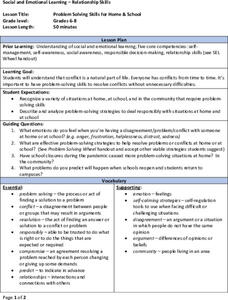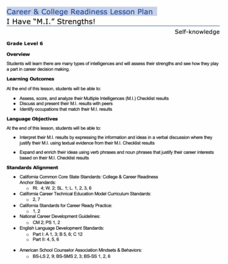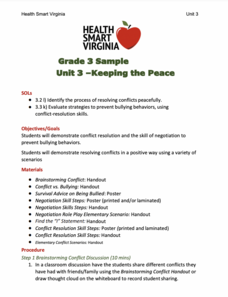Overcoming Obstacles
Having a Positive Attitude
Through discussion and reflection, scholars discover what it means to have a positive attitude, that an individual can choose to stay positive, and discuss the benefits of a positive attitude. Learners listen to negative scenarios to...
Overcoming Obstacles
Respect
A social-emotional lesson focuses on respect. Scholars define the term and puzzle out the word. Pupils give examples of respect they observe at home, at school, and in the community. Cards showcase scenarios in that participants identify...
Overcoming Obstacles
Resolving Conflicts
A lesson about resolving conflicts guides young scholars through the process of identifying emotions and reflecting on the situation, all before taking action. The lesson encourages class members to stay open-minded and listen to the...
Overcoming Obstacles
Kindness
Encourage kindness with a lesson that defines kindness, asks scholars how to show kindness, and share how others have shown them kindness. Multiple activities prove that kindness is easy to give through coloring, storytelling, a game of...
Overcoming Obstacles
Coping Skills
A lesson brings awareness to a variety of emotions. After discussing the many types of emotions, scholars create a list sorting emotions as easy and hard and then brainstorm coping skills. Pupils draw a picture depicting a scenario that...
Lions Clubs International Foundation
Mindful Self-Awareness Exercise: Accurate Self-Perception
Scholars think to themselves about what is something that they are good at and what makes them a good person. A prompt asks them to reflect on their feelings when they think of their positive attributes.
Lions Clubs International Foundation
Mindful Self-Management Exercise: Self-Motivation
Encourage self-motivation with an activity that allows scholars to reflect on their challenges and set goals to better them. A script prompts pupils to listen to the Can-Do Coach inside them. An inspiring statement reminds participants...
Lions Clubs International Foundation
Mindful Self-Awareness Exercise: Recognizing Strengths
Learners think of something they're good at and reflect on how they feel about it. Pupils then think of ways to be even better at it and set a mental goal to practice.
Lions Clubs International Foundation
Mindful Self-Management Exercise: Managing Stress
An exercise offers young scholars a coping skill to manage stress or other strong emotions. Learners identify the emotion, focus on how their body feels physically, then pretend they are holding a balloon over their heads, blow their...
Lions Clubs International Foundation
Mindful Self-Management Exercise: Impulse Control
A coping skill helps to manage emotions. Young scholars pretend they are a remote control. When they feel strongly about something, they pause their actions, take a deep breath, reflect, and press play to get back to what they were doing.
Lions Clubs International Foundation
Mindful Self-Awareness Exercise: Identifying Feelings
Young scholars identify feelings through facial expressions and body language. Learners listen for a feeling word, then act it out and discuss how they portrayed it.
Lions Clubs International Foundation
I Can Keep Calm
Strong emotions may arise at anytime and any where. This activity boosts self-awareness and management for when young learners require assistance with their feelings. Tips include: remaining calm, breathing, explaining how they feel, and...
Lions Clubs International Foundation
Mindful Self-Management Exercise: Managing Stress
Help scholars manage stress with an activity that prompts them to think of their feelings as clouds floating over their heads. Learners identify their feelings, focus on their responses, and allow them to float away.
Lions Clubs International Foundation
Mindful Self-Awareness Exercise: Identifying Feelings
Following a breathing exercise, scholars examine facial expressions and body posture to identify feelings. The exercise ends with a reflection.
Lions Clubs International Foundation
Mindful Self-Management Exercise: Pausing the Action
A self-management exercise allows scholars to mindfully pause the action by identifying emotions and changing their thought processes. When pupils feel strongly about something, they imagine themselves as a remote they can pause to...
Education Foundation of Sarasota County
Problem Solving Skills for Home and School
Dr. Seuss' The Zax has a lesson to teach tweens and teens about the importance of problem-solving skills. After viewing the short video, groups identify conflicts that may occur at home, in school or in the community. They then...
National Institute of Drug Abuse
Nurturing My Mental and Emotional Health
One exercise does not necessarily work for all! A resource from the National Institutes of Health provides tweens and teens with exercises to help them cope with anxiety and stress. Participants note their stress levels before and after...
Florida Department of Health
Mental and Emotional Health Education Unit
Stressed out? To begin a mental and emotional health unit, participants take a stress test to determine their level of stress. They study the effects of stress, identify sources of stress in their lives, and learn different ways to...
Inner Health Studio
Stress Management
Learners practice identifying their individual causes of stress, as well as finding healthy coping skills to deal with stress, in a series of short-answer response worksheets.
California Department of Education
I Have “M.I.” Strengths!
Scholars complete an interest survey to discover their learning style. Based on their newfound knowledge, learners examine and discuss a list of careers that work best with their learning style.
Health Smart Virginia
Emotions
Five activity ideas begin a six-part series that looks closely at social-emotional competencies. Activities include ways to incorporate kindness, several lessons from Kids Health, a variety of mindfulness practices, scenario discussions,...
Health Smart Virginia
Inside Out Emotions
Following a viewing of Disney/Pixar's Inside Out, scholars list the five emotions depicted in the film—joy, sadness, anger, fear, and disgust. Learners complete a handout and discuss their answers. To close the lesson, peers share a...
Health Smart Virginia
Keeping the Peace
A lesson examines ways young learners can keep the peace with conflict resolution. Scholars share a conflict then discuss the difference between conflicts and bullying. Pupils read scenarios and practice their negation skills.
Health Smart Virginia
Communication
In preparation for a game in which they guess the type of communication used in a scenario, scholars examine and discuss the four types of communication: passive, aggressive, assertive, and passive-aggressive. Learners identify "I"...

























